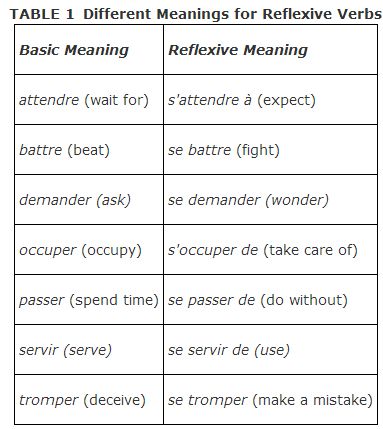Reflexive or Non‐Reflexive?
The meaning of certain verbs allows the use of the verb either as reflexive or non‐reflexive, depending upon whom the action is performed. Me, te, se, nous, and vous are also used as direct and indirect object pronouns when not used reflexively. Be sure, therefore, to pay attention to the meaning you wish to convey.
- Je me lave. (I wash myself.)
- Je lave la voiture. (I wash the car.)
- Il se réveille. (He wakes [himself] up.)
- Il me réveille. (He wakes me up.)
Some verbs in French have different meanings when used reflexively, as shown in Table 1.

Even verbs that are not generally used as reflexive verbs may be made reflexive by adding the reflexive pronoun:
- Je prépare le dîner. (I prepare dinner.)
- Je me prépare. (I prepare myself.)
Reflexive verbs may be used in the plural to express reciprocal action meaning “each other” or “one another:”
- Nous nous parlons. (We speak to each other.)
- Vous vous regardez. (You look at one another.)